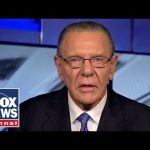In a dramatic showdown on Capitol Hill, a recent hearing featured health secretary RFK Jr. facing a wave of fiery criticism from Democrats. The tension was palpable as the exchange unfolded, showcasing not just heated dialogue but also the deep divisions within American politics over health policies and the ongoing fallout from the COVID-19 pandemic. As the meeting progressed, it became evident that the stakes were high, with both sides fervently defending their positions.
Democratic representatives did not hold back in their accusations, branding RFK Jr. as a “charlatan” and questioning his grasp of the COVID death toll. It was a chaotic scene, with questions about how he, as health secretary, could be so out of touch. His responses, however, painted a much different picture, suggesting that the information chaos surrounding the pandemic made accurate counts nearly impossible. This led to an exploration of broader issues—like the influence of big pharmaceutical companies on health policy and individual responsibility in a country grappling with obesity and health challenges.
Intriguingly, RFK Jr. pointed out the contradictions in health messaging and the financial ties some politicians have with pharmaceutical firms. He called out prominent political figures like Elizabeth Warren and questioned how they could position themselves as advocates for health while accepting substantial funding from the very industries in question. This admission struck a chord, sparking curiosity and laughter, but it also prompted a serious discussion about trust in public health communication.
The ongoing pandemic has turned health conversations into battlegrounds, where opinions often clash more than they converge. Despite the heated exchanges, some observers found humor in the absurdity of the situation, with comments about fashion and fitness thrown in for good measure. The hearing even featured some light-hearted banter, illustrating the ways humor can alleviate stress in tense political atmospheres while underscoring the gravity of the issues at hand.
As the hearing wrapped up, the conversation shifted to broader health concerns facing Americans today, highlighting alarming statistics about obesity and chronic illness. This discussion is crucial, as it raises questions about governmental accountability and public health initiatives. People are increasingly asking for clarity on what can be done to improve the health of the nation rather than just focusing on vaccination campaigns. With a significant portion of the population dealing with health challenges, it’s clear that the conversation needs to evolve beyond merely assigning blame to exploring actionable solutions that genuinely support public well-being.
In summary, the clash on Capitol Hill was more than just a political spectacle; it reflected deep-seated concerns about health policy, accountability, and the roles that various stakeholders play in shaping America’s health landscape. The events serve as a reminder that discussions about health should not only revolve around statistics and blame but also incorporate a genuine commitment to improving lives across the nation.




